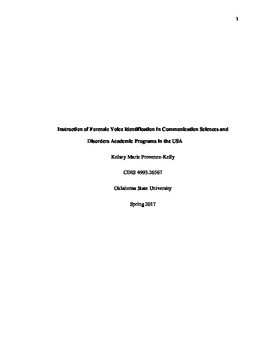| dc.contributor.author | Provence-Kelly, Kelsey Marie | |
| dc.date.accessioned | 2019-02-09T14:24:27Z | |
| dc.date.available | 2019-02-09T14:24:27Z | |
| dc.date.issued | 2017-06-30 | |
| dc.identifier | oksd_provence-kelly_HT_2017 | |
| dc.identifier.uri | https://hdl.handle.net/11244/317253 | |
| dc.description.abstract | Introduction: The field of Communication Sciences and Disorders (CDIS) offers many different and diverse career paths. These range from speech pathology and audiology, to even forensic voice science. The researchers hypothesized that student knowledge of forensic voice science is lacking in CDIS programs across the United States. A survey was formulated to uncover what the perceptions of careers in forensic voice science are amongst undergraduate and graduate students in CDIS programs across the United States. Little research is available about how forensic voice science is taught in universities, and this research looks to help fill that gap. | |
| dc.description.abstract | Methods: A survey consisting of 35 total questions was created through Qualtrics. The first section of the survey focused on demographics and whether the respondent had completed a speech science or related course. Respondents who had completed such a courses were directed to a series of questions about their knowledge of acoustic parameters, forensic voice science, and how acoustic parameters relate to forensic voice science. Respondents were then directed to questions about how the acoustic parameters were taught in their class and why they thought instruction in forensic voice science was lacking. Respondents who had not taken a speech science or related course were directed to a series of questions about their knowledge of forensic voice science and how they had gained this knowledge. The research team sent out emails to academic advisors and a program directors in CDIS programs and requested that the link to the perceptions of forensic voice science survey be sent out to all the students in the program. A total of 206 academic programs were contacted. | |
| dc.description.abstract | Results: A total of 409 responses were recorded, with 391 participants having taken a speech science or related course. Of those 391 responses, 61% could draw a correlation between speech science and forensic voice science. While the majority of participants responded that they understood the acoustic parameters commonly taught in speech science courses, only 5% were aware that a background in speech science enables a student to pursue further education in forensic voice science. The results strongly indicated that students have a good foundation in the basics of the tools used in forensic voice science, but there is little to no instruction about forensic voice science in the classroom or textbooks that are used. | |
| dc.description.abstract | Discussion: Speech science primarily focuses on the science of speech production and speech perception. Although students in this course are well poised to be the consumers of information that can be applied in forensic voice science seldom we see students who go on to make a career as a forensic speech scientist. So the current study aimed at investigating the instruction of forensic voice science in speech science courses that were taught in CSD programs across the United States. The results of the survey indicate that the basic fundamentals used in forensic speech science are taught in most speech science courses across the United States, but overall, there is little to no instruction about the applications of speech science concepts in forensic voice science. Overall, CSD students are well equipped with the knowledge of underlying principles for speaker identification in forensic speech science, but very few understand the applications and career options available to them in this field. | |
| dc.format | application/pdf | |
| dc.language | en_US | |
| dc.rights | Copyright is held by the author who has granted the Oklahoma State University Library the non-exclusive right to share this material in its institutional repository. Contact Digital Library Services at lib-dls@okstate.edu or 405-744-9161 for the permission policy on the use, reproduction or distribution of this material. | |
| dc.title | Instruction of forensic voice identification in Communication Sciences and Disorders academic programs in the USA | |
| osu.filename | oksd_provence-kelly_HT_2017.pdf | |
| osu.accesstype | Open Access | |
| dc.type.genre | Honors Thesis | |
| dc.type.material | Text | |
| dc.contributor.director | Kaipa, Ramesh | |
| dc.contributor.facultyreader | Caplow, Nancy | |
| thesis.degree.discipline | Communication Sciences and Disorders | |
| thesis.degree.grantor | Oklahoma State University | |
